Operations and Supply Chain Management: Sustainable Practices in NZ
VerifiedAdded on 2022/12/15
|14
|4580
|248
Report
AI Summary
This report examines the sustainable operations of exemplar companies in New Zealand, focusing on environmental management and supply chain practices. It begins with an executive summary and introduction, defining sustainable operations and explaining the approach taken. A literature review explores the sustainability initiatives of Vodafone and DB Breweries, highlighting their strategies for environmental responsibility. Vodafone's initiatives include mobile recycling programs, while DB Breweries focuses on reducing carbon emissions, protecting water resources, and promoting health and safety. The report analyzes the implementation of HEINEKEN’s Brewing a Better World framework by DB Breweries, including their goals aligned with the United Nations Sustainable Development Goals. The discussion section analyzes the findings, and the conclusion summarizes the key insights and findings of the report. The report concludes with references of the sources used.
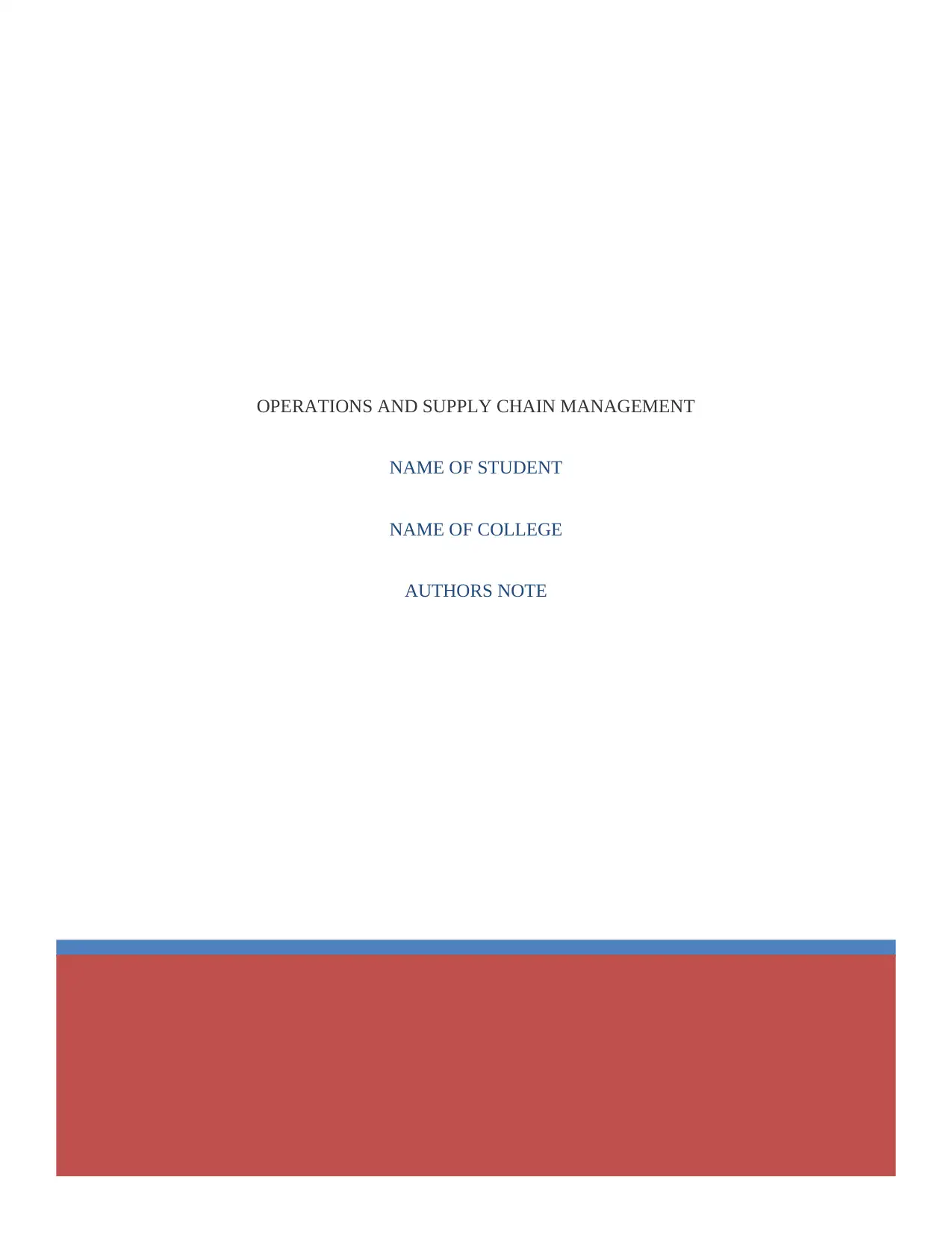
OPERATIONS AND SUPPLY CHAIN MANAGEMENT
NAME OF STUDENT
NAME OF COLLEGE
AUTHORS NOTE
NAME OF STUDENT
NAME OF COLLEGE
AUTHORS NOTE
Paraphrase This Document
Need a fresh take? Get an instant paraphrase of this document with our AI Paraphraser
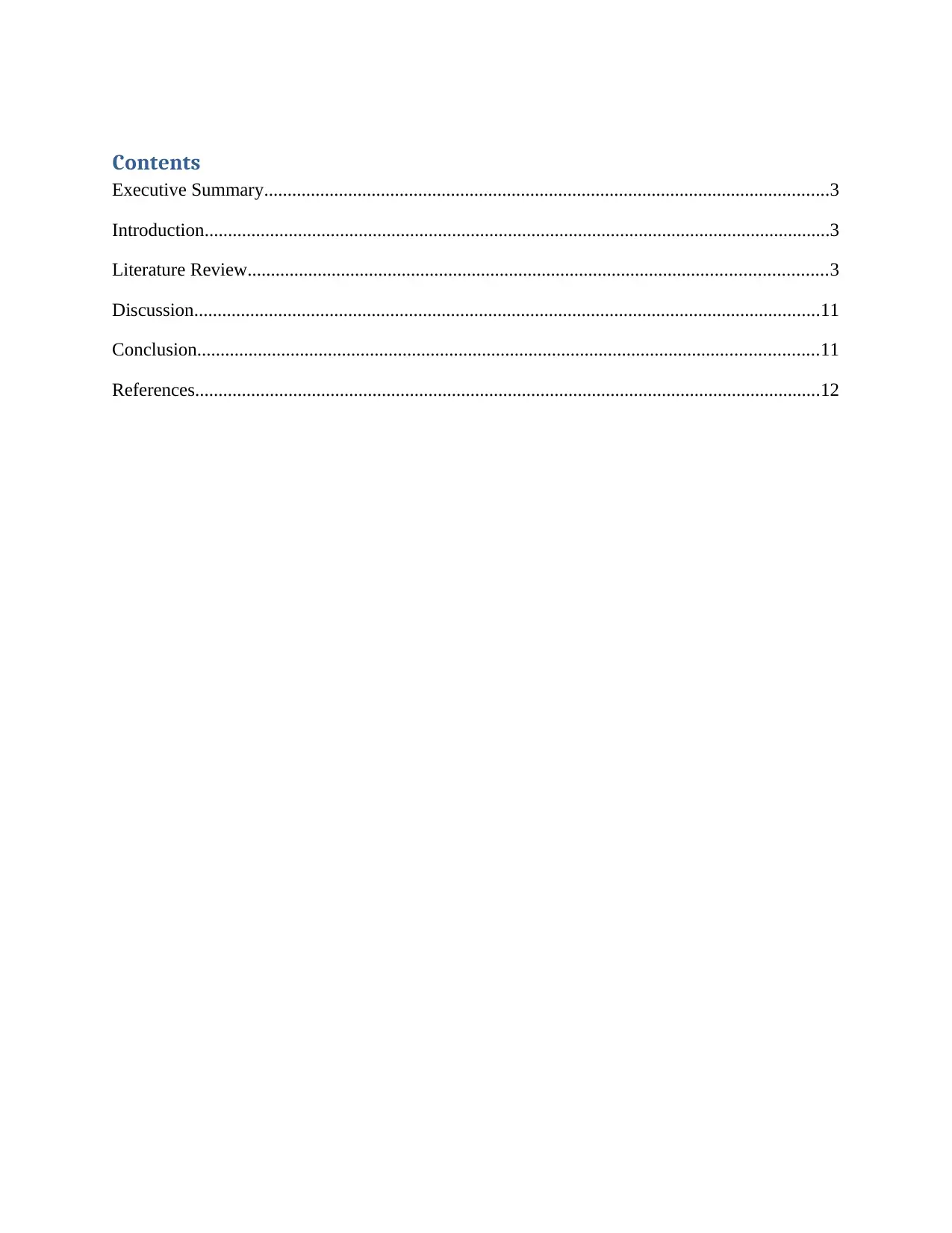
Contents
Executive Summary.........................................................................................................................3
Introduction......................................................................................................................................3
Literature Review............................................................................................................................3
Discussion......................................................................................................................................11
Conclusion.....................................................................................................................................11
References......................................................................................................................................12
Executive Summary.........................................................................................................................3
Introduction......................................................................................................................................3
Literature Review............................................................................................................................3
Discussion......................................................................................................................................11
Conclusion.....................................................................................................................................11
References......................................................................................................................................12
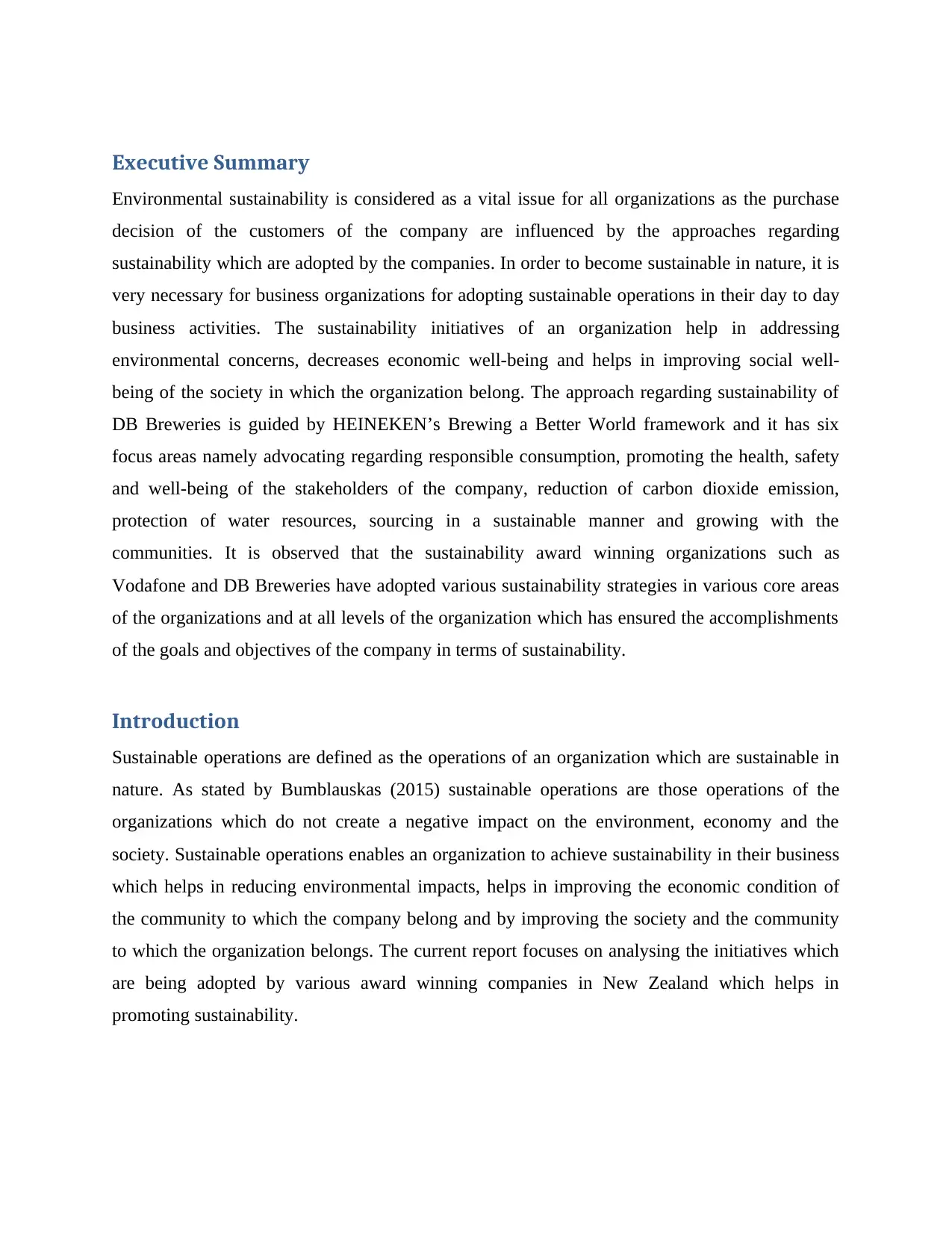
Executive Summary
Environmental sustainability is considered as a vital issue for all organizations as the purchase
decision of the customers of the company are influenced by the approaches regarding
sustainability which are adopted by the companies. In order to become sustainable in nature, it is
very necessary for business organizations for adopting sustainable operations in their day to day
business activities. The sustainability initiatives of an organization help in addressing
environmental concerns, decreases economic well-being and helps in improving social well-
being of the society in which the organization belong. The approach regarding sustainability of
DB Breweries is guided by HEINEKEN’s Brewing a Better World framework and it has six
focus areas namely advocating regarding responsible consumption, promoting the health, safety
and well-being of the stakeholders of the company, reduction of carbon dioxide emission,
protection of water resources, sourcing in a sustainable manner and growing with the
communities. It is observed that the sustainability award winning organizations such as
Vodafone and DB Breweries have adopted various sustainability strategies in various core areas
of the organizations and at all levels of the organization which has ensured the accomplishments
of the goals and objectives of the company in terms of sustainability.
Introduction
Sustainable operations are defined as the operations of an organization which are sustainable in
nature. As stated by Bumblauskas (2015) sustainable operations are those operations of the
organizations which do not create a negative impact on the environment, economy and the
society. Sustainable operations enables an organization to achieve sustainability in their business
which helps in reducing environmental impacts, helps in improving the economic condition of
the community to which the company belong and by improving the society and the community
to which the organization belongs. The current report focuses on analysing the initiatives which
are being adopted by various award winning companies in New Zealand which helps in
promoting sustainability.
Environmental sustainability is considered as a vital issue for all organizations as the purchase
decision of the customers of the company are influenced by the approaches regarding
sustainability which are adopted by the companies. In order to become sustainable in nature, it is
very necessary for business organizations for adopting sustainable operations in their day to day
business activities. The sustainability initiatives of an organization help in addressing
environmental concerns, decreases economic well-being and helps in improving social well-
being of the society in which the organization belong. The approach regarding sustainability of
DB Breweries is guided by HEINEKEN’s Brewing a Better World framework and it has six
focus areas namely advocating regarding responsible consumption, promoting the health, safety
and well-being of the stakeholders of the company, reduction of carbon dioxide emission,
protection of water resources, sourcing in a sustainable manner and growing with the
communities. It is observed that the sustainability award winning organizations such as
Vodafone and DB Breweries have adopted various sustainability strategies in various core areas
of the organizations and at all levels of the organization which has ensured the accomplishments
of the goals and objectives of the company in terms of sustainability.
Introduction
Sustainable operations are defined as the operations of an organization which are sustainable in
nature. As stated by Bumblauskas (2015) sustainable operations are those operations of the
organizations which do not create a negative impact on the environment, economy and the
society. Sustainable operations enables an organization to achieve sustainability in their business
which helps in reducing environmental impacts, helps in improving the economic condition of
the community to which the company belong and by improving the society and the community
to which the organization belongs. The current report focuses on analysing the initiatives which
are being adopted by various award winning companies in New Zealand which helps in
promoting sustainability.
⊘ This is a preview!⊘
Do you want full access?
Subscribe today to unlock all pages.

Trusted by 1+ million students worldwide
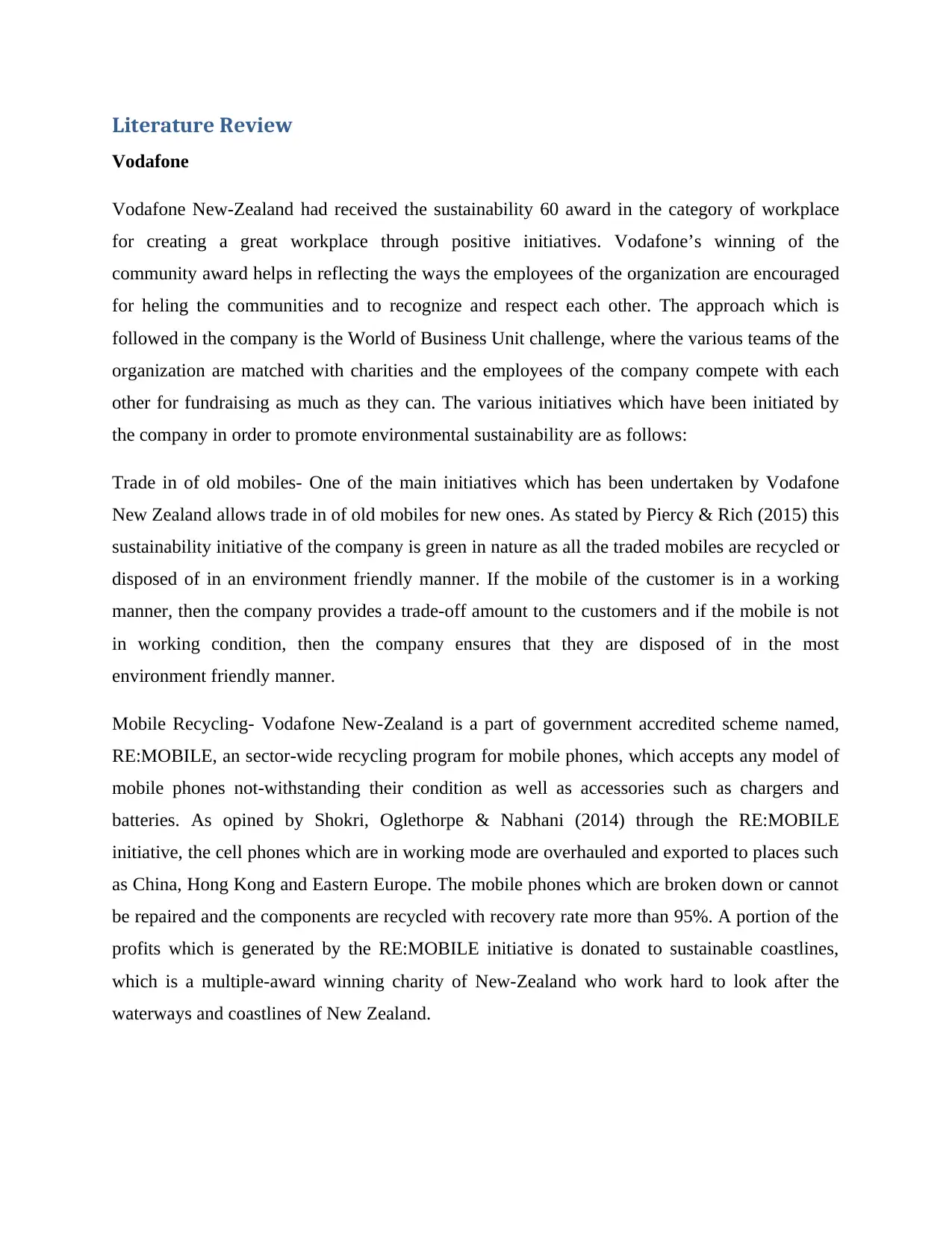
Literature Review
Vodafone
Vodafone New-Zealand had received the sustainability 60 award in the category of workplace
for creating a great workplace through positive initiatives. Vodafone’s winning of the
community award helps in reflecting the ways the employees of the organization are encouraged
for heling the communities and to recognize and respect each other. The approach which is
followed in the company is the World of Business Unit challenge, where the various teams of the
organization are matched with charities and the employees of the company compete with each
other for fundraising as much as they can. The various initiatives which have been initiated by
the company in order to promote environmental sustainability are as follows:
Trade in of old mobiles- One of the main initiatives which has been undertaken by Vodafone
New Zealand allows trade in of old mobiles for new ones. As stated by Piercy & Rich (2015) this
sustainability initiative of the company is green in nature as all the traded mobiles are recycled or
disposed of in an environment friendly manner. If the mobile of the customer is in a working
manner, then the company provides a trade-off amount to the customers and if the mobile is not
in working condition, then the company ensures that they are disposed of in the most
environment friendly manner.
Mobile Recycling- Vodafone New-Zealand is a part of government accredited scheme named,
RE:MOBILE, an sector-wide recycling program for mobile phones, which accepts any model of
mobile phones not-withstanding their condition as well as accessories such as chargers and
batteries. As opined by Shokri, Oglethorpe & Nabhani (2014) through the RE:MOBILE
initiative, the cell phones which are in working mode are overhauled and exported to places such
as China, Hong Kong and Eastern Europe. The mobile phones which are broken down or cannot
be repaired and the components are recycled with recovery rate more than 95%. A portion of the
profits which is generated by the RE:MOBILE initiative is donated to sustainable coastlines,
which is a multiple-award winning charity of New-Zealand who work hard to look after the
waterways and coastlines of New Zealand.
Vodafone
Vodafone New-Zealand had received the sustainability 60 award in the category of workplace
for creating a great workplace through positive initiatives. Vodafone’s winning of the
community award helps in reflecting the ways the employees of the organization are encouraged
for heling the communities and to recognize and respect each other. The approach which is
followed in the company is the World of Business Unit challenge, where the various teams of the
organization are matched with charities and the employees of the company compete with each
other for fundraising as much as they can. The various initiatives which have been initiated by
the company in order to promote environmental sustainability are as follows:
Trade in of old mobiles- One of the main initiatives which has been undertaken by Vodafone
New Zealand allows trade in of old mobiles for new ones. As stated by Piercy & Rich (2015) this
sustainability initiative of the company is green in nature as all the traded mobiles are recycled or
disposed of in an environment friendly manner. If the mobile of the customer is in a working
manner, then the company provides a trade-off amount to the customers and if the mobile is not
in working condition, then the company ensures that they are disposed of in the most
environment friendly manner.
Mobile Recycling- Vodafone New-Zealand is a part of government accredited scheme named,
RE:MOBILE, an sector-wide recycling program for mobile phones, which accepts any model of
mobile phones not-withstanding their condition as well as accessories such as chargers and
batteries. As opined by Shokri, Oglethorpe & Nabhani (2014) through the RE:MOBILE
initiative, the cell phones which are in working mode are overhauled and exported to places such
as China, Hong Kong and Eastern Europe. The mobile phones which are broken down or cannot
be repaired and the components are recycled with recovery rate more than 95%. A portion of the
profits which is generated by the RE:MOBILE initiative is donated to sustainable coastlines,
which is a multiple-award winning charity of New-Zealand who work hard to look after the
waterways and coastlines of New Zealand.
Paraphrase This Document
Need a fresh take? Get an instant paraphrase of this document with our AI Paraphraser
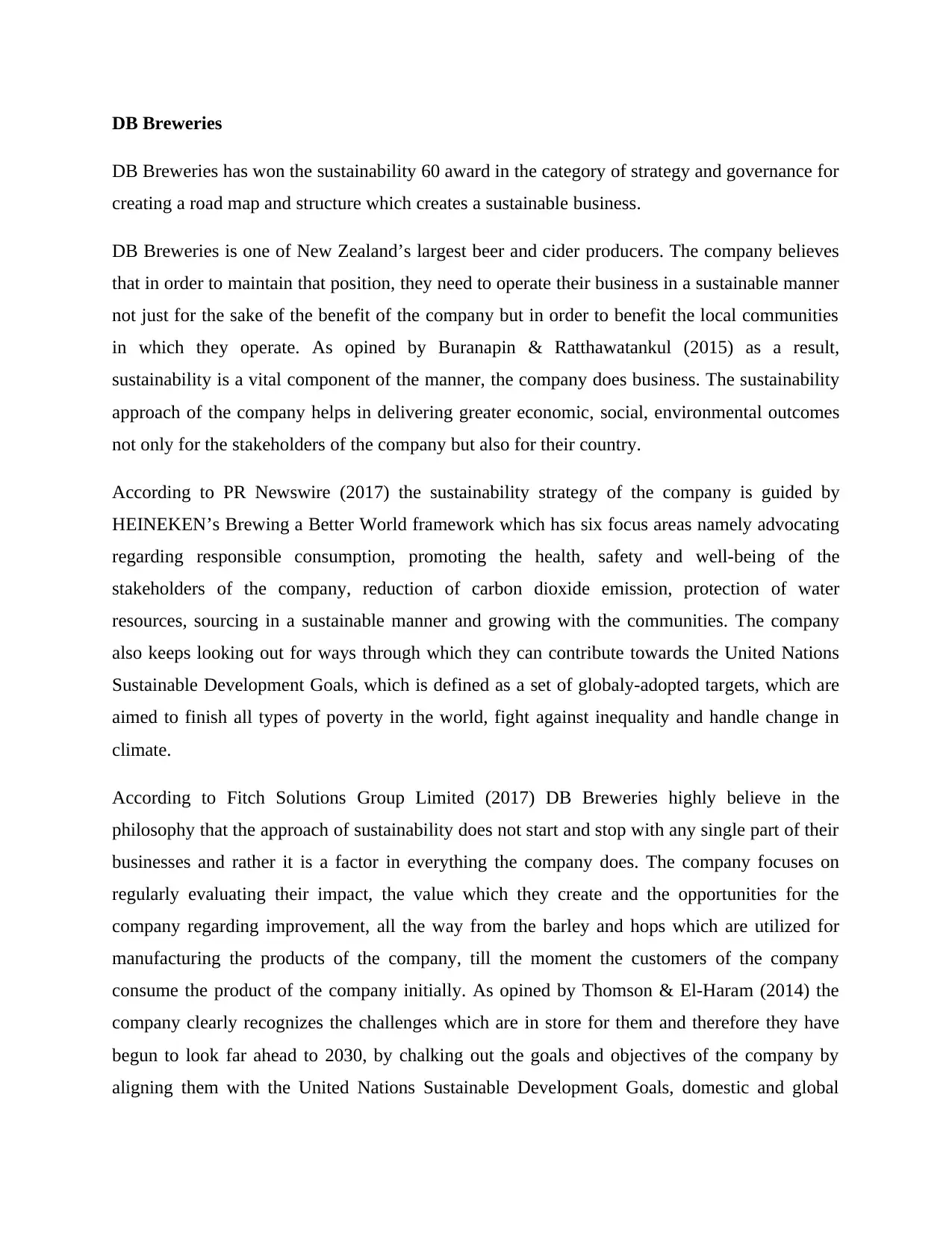
DB Breweries
DB Breweries has won the sustainability 60 award in the category of strategy and governance for
creating a road map and structure which creates a sustainable business.
DB Breweries is one of New Zealand’s largest beer and cider producers. The company believes
that in order to maintain that position, they need to operate their business in a sustainable manner
not just for the sake of the benefit of the company but in order to benefit the local communities
in which they operate. As opined by Buranapin & Ratthawatankul (2015) as a result,
sustainability is a vital component of the manner, the company does business. The sustainability
approach of the company helps in delivering greater economic, social, environmental outcomes
not only for the stakeholders of the company but also for their country.
According to PR Newswire (2017) the sustainability strategy of the company is guided by
HEINEKEN’s Brewing a Better World framework which has six focus areas namely advocating
regarding responsible consumption, promoting the health, safety and well-being of the
stakeholders of the company, reduction of carbon dioxide emission, protection of water
resources, sourcing in a sustainable manner and growing with the communities. The company
also keeps looking out for ways through which they can contribute towards the United Nations
Sustainable Development Goals, which is defined as a set of globaly-adopted targets, which are
aimed to finish all types of poverty in the world, fight against inequality and handle change in
climate.
According to Fitch Solutions Group Limited (2017) DB Breweries highly believe in the
philosophy that the approach of sustainability does not start and stop with any single part of their
businesses and rather it is a factor in everything the company does. The company focuses on
regularly evaluating their impact, the value which they create and the opportunities for the
company regarding improvement, all the way from the barley and hops which are utilized for
manufacturing the products of the company, till the moment the customers of the company
consume the product of the company initially. As opined by Thomson & El-Haram (2014) the
company clearly recognizes the challenges which are in store for them and therefore they have
begun to look far ahead to 2030, by chalking out the goals and objectives of the company by
aligning them with the United Nations Sustainable Development Goals, domestic and global
DB Breweries has won the sustainability 60 award in the category of strategy and governance for
creating a road map and structure which creates a sustainable business.
DB Breweries is one of New Zealand’s largest beer and cider producers. The company believes
that in order to maintain that position, they need to operate their business in a sustainable manner
not just for the sake of the benefit of the company but in order to benefit the local communities
in which they operate. As opined by Buranapin & Ratthawatankul (2015) as a result,
sustainability is a vital component of the manner, the company does business. The sustainability
approach of the company helps in delivering greater economic, social, environmental outcomes
not only for the stakeholders of the company but also for their country.
According to PR Newswire (2017) the sustainability strategy of the company is guided by
HEINEKEN’s Brewing a Better World framework which has six focus areas namely advocating
regarding responsible consumption, promoting the health, safety and well-being of the
stakeholders of the company, reduction of carbon dioxide emission, protection of water
resources, sourcing in a sustainable manner and growing with the communities. The company
also keeps looking out for ways through which they can contribute towards the United Nations
Sustainable Development Goals, which is defined as a set of globaly-adopted targets, which are
aimed to finish all types of poverty in the world, fight against inequality and handle change in
climate.
According to Fitch Solutions Group Limited (2017) DB Breweries highly believe in the
philosophy that the approach of sustainability does not start and stop with any single part of their
businesses and rather it is a factor in everything the company does. The company focuses on
regularly evaluating their impact, the value which they create and the opportunities for the
company regarding improvement, all the way from the barley and hops which are utilized for
manufacturing the products of the company, till the moment the customers of the company
consume the product of the company initially. As opined by Thomson & El-Haram (2014) the
company clearly recognizes the challenges which are in store for them and therefore they have
begun to look far ahead to 2030, by chalking out the goals and objectives of the company by
aligning them with the United Nations Sustainable Development Goals, domestic and global
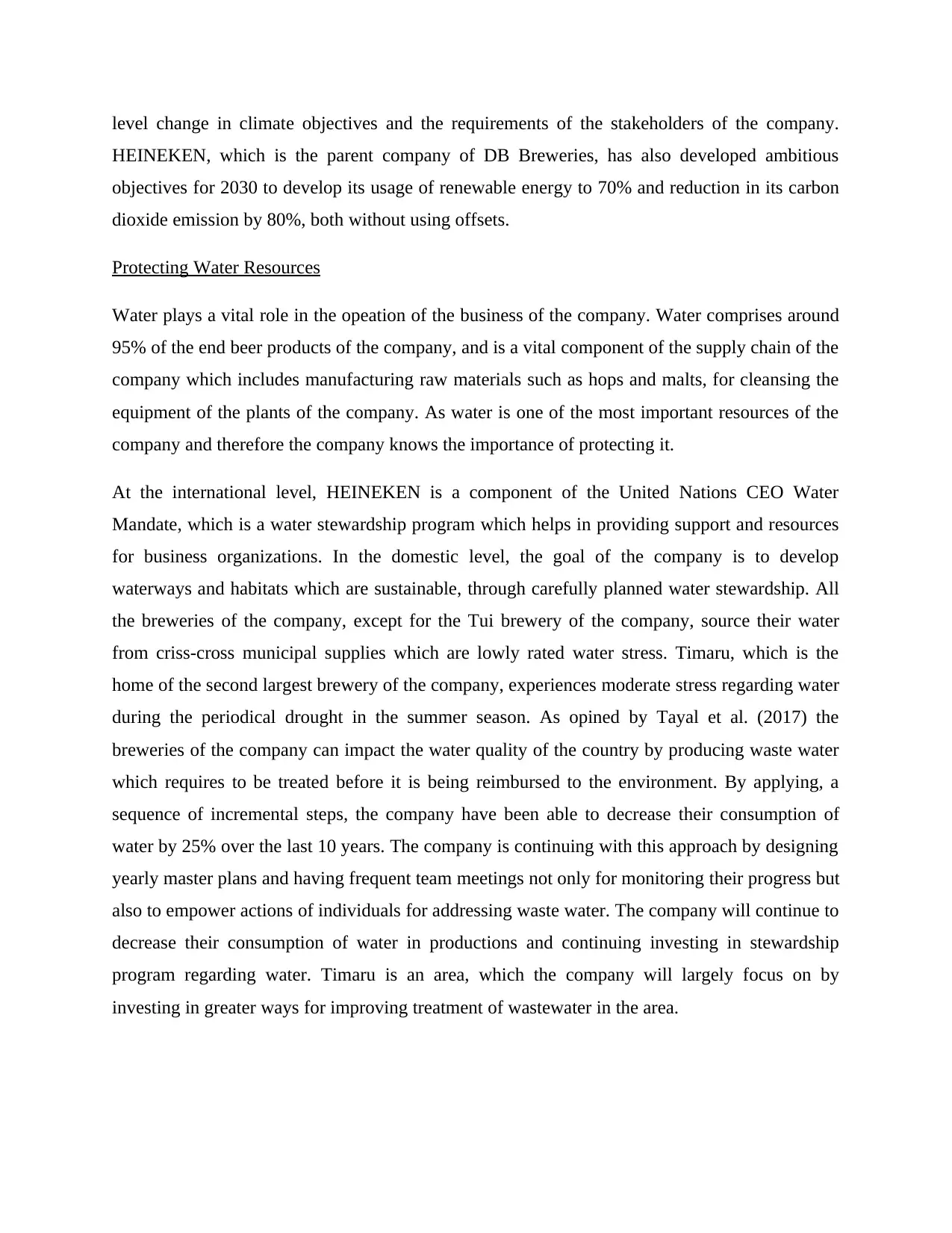
level change in climate objectives and the requirements of the stakeholders of the company.
HEINEKEN, which is the parent company of DB Breweries, has also developed ambitious
objectives for 2030 to develop its usage of renewable energy to 70% and reduction in its carbon
dioxide emission by 80%, both without using offsets.
Protecting Water Resources
Water plays a vital role in the opeation of the business of the company. Water comprises around
95% of the end beer products of the company, and is a vital component of the supply chain of the
company which includes manufacturing raw materials such as hops and malts, for cleansing the
equipment of the plants of the company. As water is one of the most important resources of the
company and therefore the company knows the importance of protecting it.
At the international level, HEINEKEN is a component of the United Nations CEO Water
Mandate, which is a water stewardship program which helps in providing support and resources
for business organizations. In the domestic level, the goal of the company is to develop
waterways and habitats which are sustainable, through carefully planned water stewardship. All
the breweries of the company, except for the Tui brewery of the company, source their water
from criss-cross municipal supplies which are lowly rated water stress. Timaru, which is the
home of the second largest brewery of the company, experiences moderate stress regarding water
during the periodical drought in the summer season. As opined by Tayal et al. (2017) the
breweries of the company can impact the water quality of the country by producing waste water
which requires to be treated before it is being reimbursed to the environment. By applying, a
sequence of incremental steps, the company have been able to decrease their consumption of
water by 25% over the last 10 years. The company is continuing with this approach by designing
yearly master plans and having frequent team meetings not only for monitoring their progress but
also to empower actions of individuals for addressing waste water. The company will continue to
decrease their consumption of water in productions and continuing investing in stewardship
program regarding water. Timaru is an area, which the company will largely focus on by
investing in greater ways for improving treatment of wastewater in the area.
HEINEKEN, which is the parent company of DB Breweries, has also developed ambitious
objectives for 2030 to develop its usage of renewable energy to 70% and reduction in its carbon
dioxide emission by 80%, both without using offsets.
Protecting Water Resources
Water plays a vital role in the opeation of the business of the company. Water comprises around
95% of the end beer products of the company, and is a vital component of the supply chain of the
company which includes manufacturing raw materials such as hops and malts, for cleansing the
equipment of the plants of the company. As water is one of the most important resources of the
company and therefore the company knows the importance of protecting it.
At the international level, HEINEKEN is a component of the United Nations CEO Water
Mandate, which is a water stewardship program which helps in providing support and resources
for business organizations. In the domestic level, the goal of the company is to develop
waterways and habitats which are sustainable, through carefully planned water stewardship. All
the breweries of the company, except for the Tui brewery of the company, source their water
from criss-cross municipal supplies which are lowly rated water stress. Timaru, which is the
home of the second largest brewery of the company, experiences moderate stress regarding water
during the periodical drought in the summer season. As opined by Tayal et al. (2017) the
breweries of the company can impact the water quality of the country by producing waste water
which requires to be treated before it is being reimbursed to the environment. By applying, a
sequence of incremental steps, the company have been able to decrease their consumption of
water by 25% over the last 10 years. The company is continuing with this approach by designing
yearly master plans and having frequent team meetings not only for monitoring their progress but
also to empower actions of individuals for addressing waste water. The company will continue to
decrease their consumption of water in productions and continuing investing in stewardship
program regarding water. Timaru is an area, which the company will largely focus on by
investing in greater ways for improving treatment of wastewater in the area.
⊘ This is a preview!⊘
Do you want full access?
Subscribe today to unlock all pages.

Trusted by 1+ million students worldwide
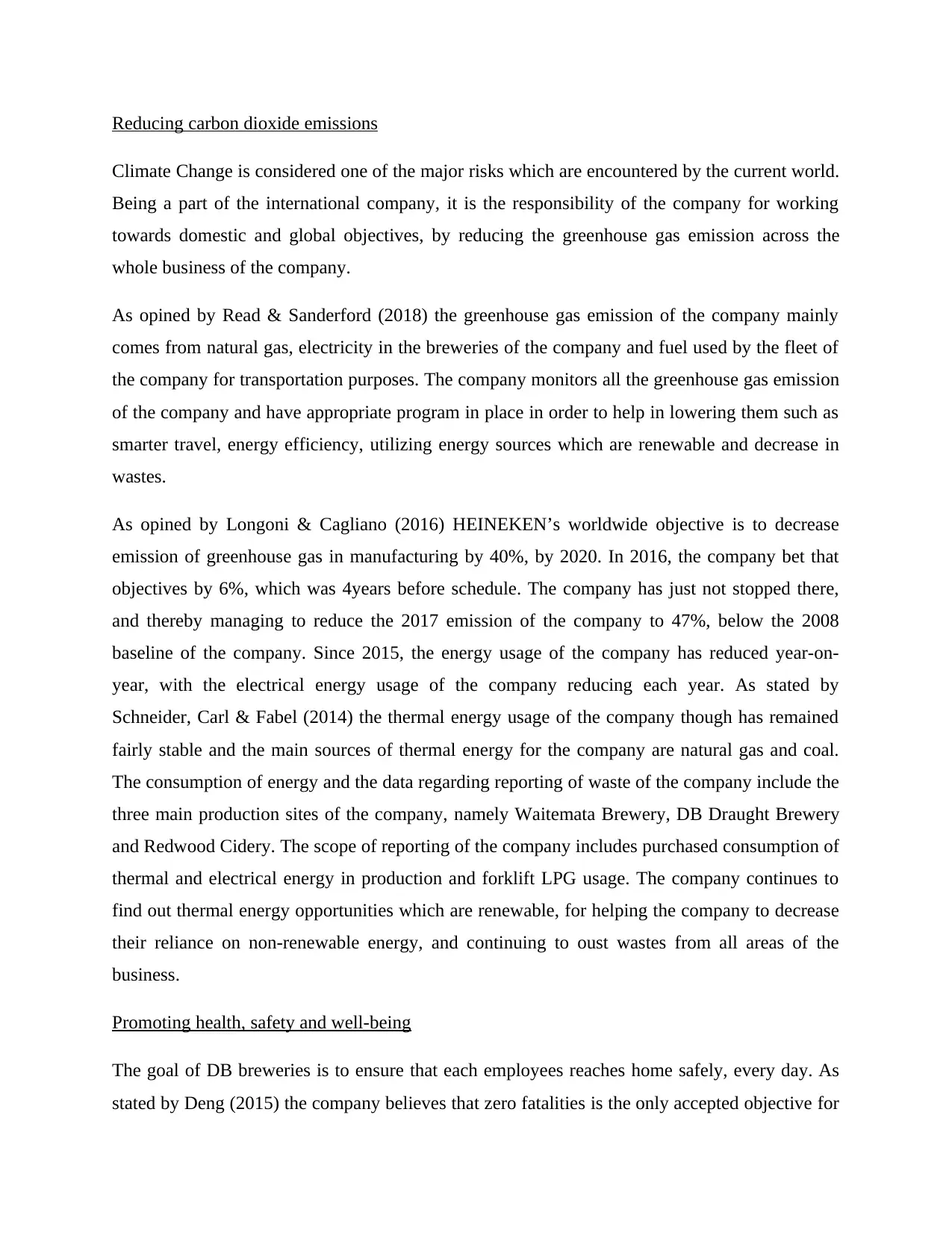
Reducing carbon dioxide emissions
Climate Change is considered one of the major risks which are encountered by the current world.
Being a part of the international company, it is the responsibility of the company for working
towards domestic and global objectives, by reducing the greenhouse gas emission across the
whole business of the company.
As opined by Read & Sanderford (2018) the greenhouse gas emission of the company mainly
comes from natural gas, electricity in the breweries of the company and fuel used by the fleet of
the company for transportation purposes. The company monitors all the greenhouse gas emission
of the company and have appropriate program in place in order to help in lowering them such as
smarter travel, energy efficiency, utilizing energy sources which are renewable and decrease in
wastes.
As opined by Longoni & Cagliano (2016) HEINEKEN’s worldwide objective is to decrease
emission of greenhouse gas in manufacturing by 40%, by 2020. In 2016, the company bet that
objectives by 6%, which was 4years before schedule. The company has just not stopped there,
and thereby managing to reduce the 2017 emission of the company to 47%, below the 2008
baseline of the company. Since 2015, the energy usage of the company has reduced year-on-
year, with the electrical energy usage of the company reducing each year. As stated by
Schneider, Carl & Fabel (2014) the thermal energy usage of the company though has remained
fairly stable and the main sources of thermal energy for the company are natural gas and coal.
The consumption of energy and the data regarding reporting of waste of the company include the
three main production sites of the company, namely Waitemata Brewery, DB Draught Brewery
and Redwood Cidery. The scope of reporting of the company includes purchased consumption of
thermal and electrical energy in production and forklift LPG usage. The company continues to
find out thermal energy opportunities which are renewable, for helping the company to decrease
their reliance on non-renewable energy, and continuing to oust wastes from all areas of the
business.
Promoting health, safety and well-being
The goal of DB breweries is to ensure that each employees reaches home safely, every day. As
stated by Deng (2015) the company believes that zero fatalities is the only accepted objective for
Climate Change is considered one of the major risks which are encountered by the current world.
Being a part of the international company, it is the responsibility of the company for working
towards domestic and global objectives, by reducing the greenhouse gas emission across the
whole business of the company.
As opined by Read & Sanderford (2018) the greenhouse gas emission of the company mainly
comes from natural gas, electricity in the breweries of the company and fuel used by the fleet of
the company for transportation purposes. The company monitors all the greenhouse gas emission
of the company and have appropriate program in place in order to help in lowering them such as
smarter travel, energy efficiency, utilizing energy sources which are renewable and decrease in
wastes.
As opined by Longoni & Cagliano (2016) HEINEKEN’s worldwide objective is to decrease
emission of greenhouse gas in manufacturing by 40%, by 2020. In 2016, the company bet that
objectives by 6%, which was 4years before schedule. The company has just not stopped there,
and thereby managing to reduce the 2017 emission of the company to 47%, below the 2008
baseline of the company. Since 2015, the energy usage of the company has reduced year-on-
year, with the electrical energy usage of the company reducing each year. As stated by
Schneider, Carl & Fabel (2014) the thermal energy usage of the company though has remained
fairly stable and the main sources of thermal energy for the company are natural gas and coal.
The consumption of energy and the data regarding reporting of waste of the company include the
three main production sites of the company, namely Waitemata Brewery, DB Draught Brewery
and Redwood Cidery. The scope of reporting of the company includes purchased consumption of
thermal and electrical energy in production and forklift LPG usage. The company continues to
find out thermal energy opportunities which are renewable, for helping the company to decrease
their reliance on non-renewable energy, and continuing to oust wastes from all areas of the
business.
Promoting health, safety and well-being
The goal of DB breweries is to ensure that each employees reaches home safely, every day. As
stated by Deng (2015) the company believes that zero fatalities is the only accepted objective for
Paraphrase This Document
Need a fresh take? Get an instant paraphrase of this document with our AI Paraphraser
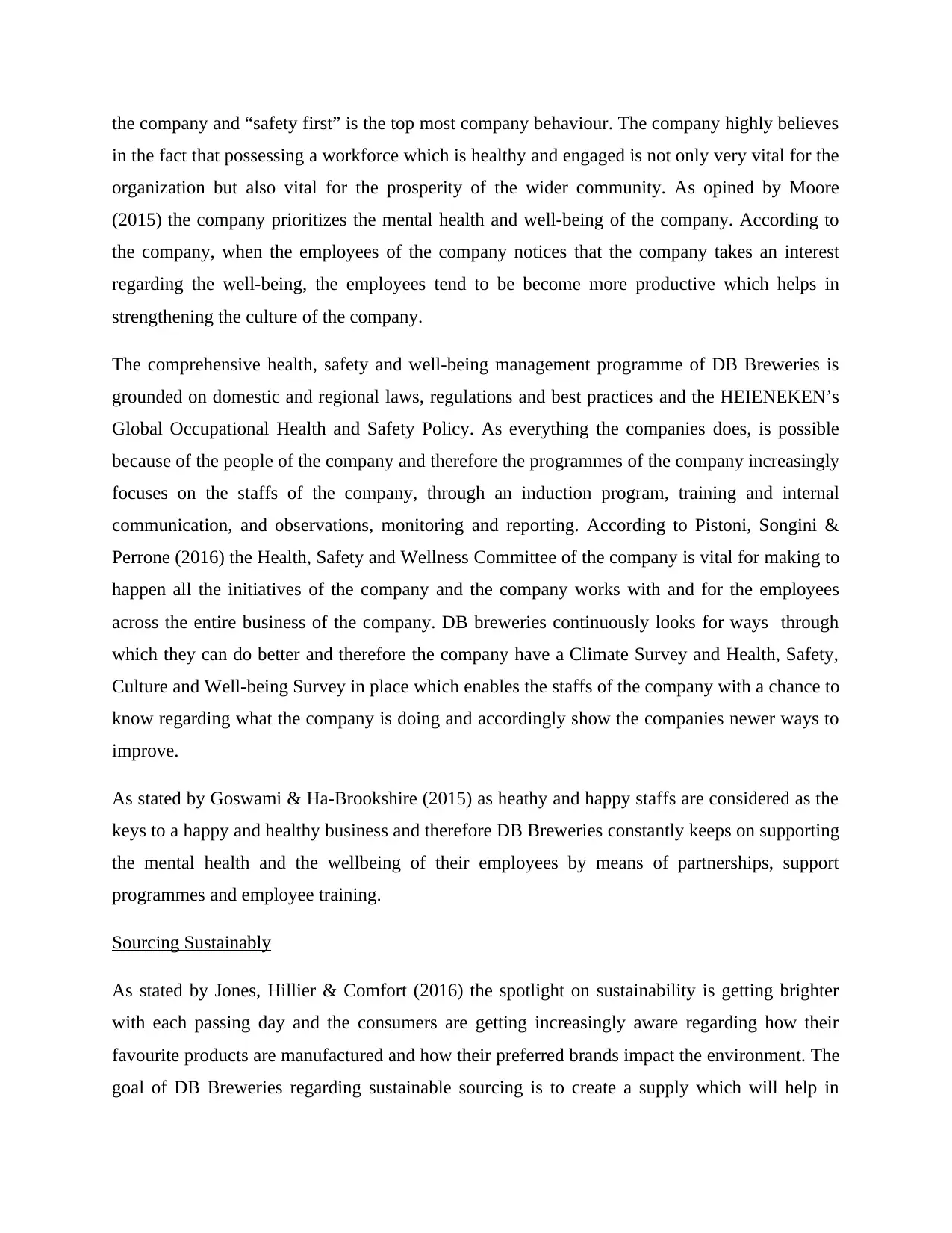
the company and “safety first” is the top most company behaviour. The company highly believes
in the fact that possessing a workforce which is healthy and engaged is not only very vital for the
organization but also vital for the prosperity of the wider community. As opined by Moore
(2015) the company prioritizes the mental health and well-being of the company. According to
the company, when the employees of the company notices that the company takes an interest
regarding the well-being, the employees tend to be become more productive which helps in
strengthening the culture of the company.
The comprehensive health, safety and well-being management programme of DB Breweries is
grounded on domestic and regional laws, regulations and best practices and the HEIENEKEN’s
Global Occupational Health and Safety Policy. As everything the companies does, is possible
because of the people of the company and therefore the programmes of the company increasingly
focuses on the staffs of the company, through an induction program, training and internal
communication, and observations, monitoring and reporting. According to Pistoni, Songini &
Perrone (2016) the Health, Safety and Wellness Committee of the company is vital for making to
happen all the initiatives of the company and the company works with and for the employees
across the entire business of the company. DB breweries continuously looks for ways through
which they can do better and therefore the company have a Climate Survey and Health, Safety,
Culture and Well-being Survey in place which enables the staffs of the company with a chance to
know regarding what the company is doing and accordingly show the companies newer ways to
improve.
As stated by Goswami & Ha-Brookshire (2015) as heathy and happy staffs are considered as the
keys to a happy and healthy business and therefore DB Breweries constantly keeps on supporting
the mental health and the wellbeing of their employees by means of partnerships, support
programmes and employee training.
Sourcing Sustainably
As stated by Jones, Hillier & Comfort (2016) the spotlight on sustainability is getting brighter
with each passing day and the consumers are getting increasingly aware regarding how their
favourite products are manufactured and how their preferred brands impact the environment. The
goal of DB Breweries regarding sustainable sourcing is to create a supply which will help in
in the fact that possessing a workforce which is healthy and engaged is not only very vital for the
organization but also vital for the prosperity of the wider community. As opined by Moore
(2015) the company prioritizes the mental health and well-being of the company. According to
the company, when the employees of the company notices that the company takes an interest
regarding the well-being, the employees tend to be become more productive which helps in
strengthening the culture of the company.
The comprehensive health, safety and well-being management programme of DB Breweries is
grounded on domestic and regional laws, regulations and best practices and the HEIENEKEN’s
Global Occupational Health and Safety Policy. As everything the companies does, is possible
because of the people of the company and therefore the programmes of the company increasingly
focuses on the staffs of the company, through an induction program, training and internal
communication, and observations, monitoring and reporting. According to Pistoni, Songini &
Perrone (2016) the Health, Safety and Wellness Committee of the company is vital for making to
happen all the initiatives of the company and the company works with and for the employees
across the entire business of the company. DB breweries continuously looks for ways through
which they can do better and therefore the company have a Climate Survey and Health, Safety,
Culture and Well-being Survey in place which enables the staffs of the company with a chance to
know regarding what the company is doing and accordingly show the companies newer ways to
improve.
As stated by Goswami & Ha-Brookshire (2015) as heathy and happy staffs are considered as the
keys to a happy and healthy business and therefore DB Breweries constantly keeps on supporting
the mental health and the wellbeing of their employees by means of partnerships, support
programmes and employee training.
Sourcing Sustainably
As stated by Jones, Hillier & Comfort (2016) the spotlight on sustainability is getting brighter
with each passing day and the consumers are getting increasingly aware regarding how their
favourite products are manufactured and how their preferred brands impact the environment. The
goal of DB Breweries regarding sustainable sourcing is to create a supply which will help in
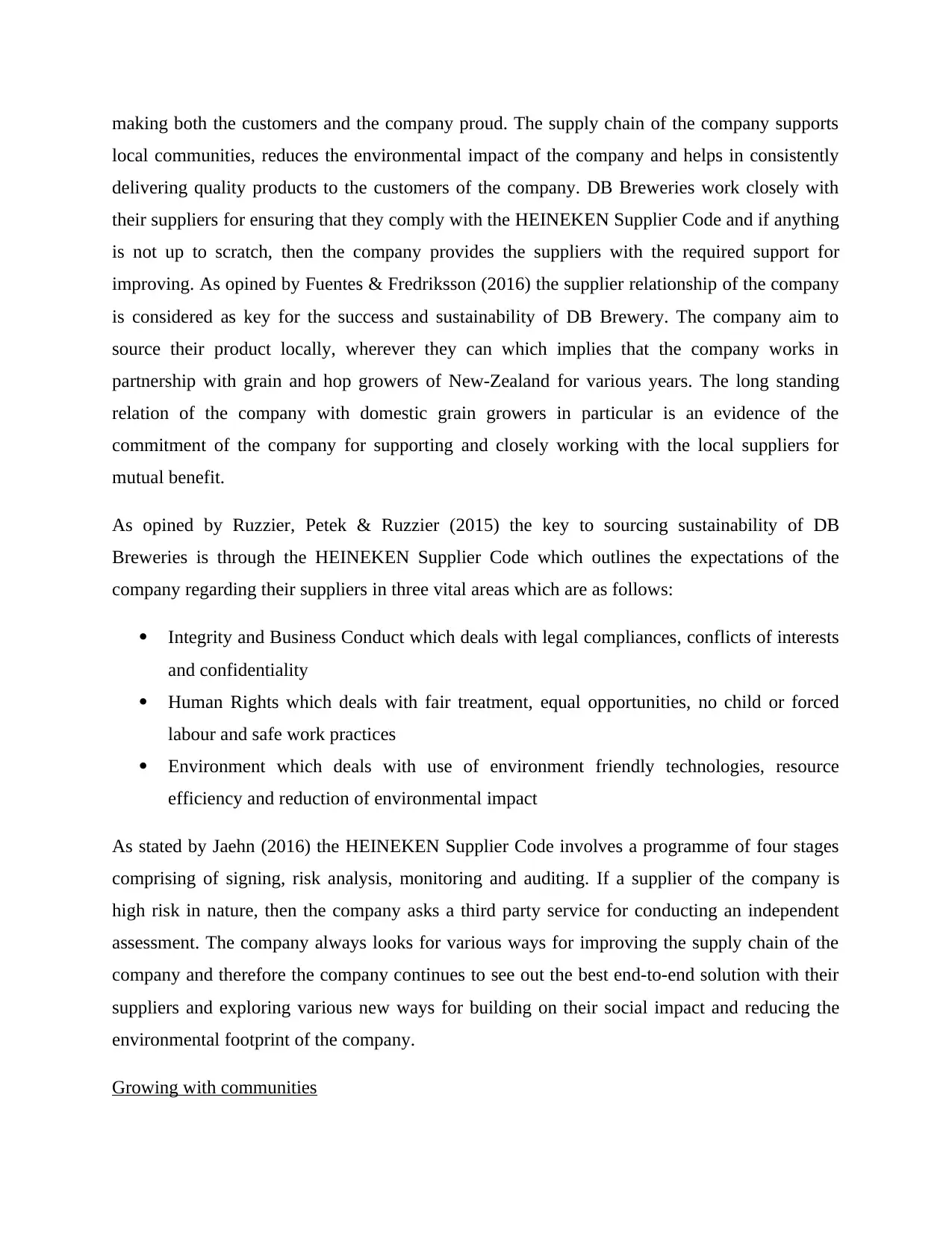
making both the customers and the company proud. The supply chain of the company supports
local communities, reduces the environmental impact of the company and helps in consistently
delivering quality products to the customers of the company. DB Breweries work closely with
their suppliers for ensuring that they comply with the HEINEKEN Supplier Code and if anything
is not up to scratch, then the company provides the suppliers with the required support for
improving. As opined by Fuentes & Fredriksson (2016) the supplier relationship of the company
is considered as key for the success and sustainability of DB Brewery. The company aim to
source their product locally, wherever they can which implies that the company works in
partnership with grain and hop growers of New-Zealand for various years. The long standing
relation of the company with domestic grain growers in particular is an evidence of the
commitment of the company for supporting and closely working with the local suppliers for
mutual benefit.
As opined by Ruzzier, Petek & Ruzzier (2015) the key to sourcing sustainability of DB
Breweries is through the HEINEKEN Supplier Code which outlines the expectations of the
company regarding their suppliers in three vital areas which are as follows:
Integrity and Business Conduct which deals with legal compliances, conflicts of interests
and confidentiality
Human Rights which deals with fair treatment, equal opportunities, no child or forced
labour and safe work practices
Environment which deals with use of environment friendly technologies, resource
efficiency and reduction of environmental impact
As stated by Jaehn (2016) the HEINEKEN Supplier Code involves a programme of four stages
comprising of signing, risk analysis, monitoring and auditing. If a supplier of the company is
high risk in nature, then the company asks a third party service for conducting an independent
assessment. The company always looks for various ways for improving the supply chain of the
company and therefore the company continues to see out the best end-to-end solution with their
suppliers and exploring various new ways for building on their social impact and reducing the
environmental footprint of the company.
Growing with communities
local communities, reduces the environmental impact of the company and helps in consistently
delivering quality products to the customers of the company. DB Breweries work closely with
their suppliers for ensuring that they comply with the HEINEKEN Supplier Code and if anything
is not up to scratch, then the company provides the suppliers with the required support for
improving. As opined by Fuentes & Fredriksson (2016) the supplier relationship of the company
is considered as key for the success and sustainability of DB Brewery. The company aim to
source their product locally, wherever they can which implies that the company works in
partnership with grain and hop growers of New-Zealand for various years. The long standing
relation of the company with domestic grain growers in particular is an evidence of the
commitment of the company for supporting and closely working with the local suppliers for
mutual benefit.
As opined by Ruzzier, Petek & Ruzzier (2015) the key to sourcing sustainability of DB
Breweries is through the HEINEKEN Supplier Code which outlines the expectations of the
company regarding their suppliers in three vital areas which are as follows:
Integrity and Business Conduct which deals with legal compliances, conflicts of interests
and confidentiality
Human Rights which deals with fair treatment, equal opportunities, no child or forced
labour and safe work practices
Environment which deals with use of environment friendly technologies, resource
efficiency and reduction of environmental impact
As stated by Jaehn (2016) the HEINEKEN Supplier Code involves a programme of four stages
comprising of signing, risk analysis, monitoring and auditing. If a supplier of the company is
high risk in nature, then the company asks a third party service for conducting an independent
assessment. The company always looks for various ways for improving the supply chain of the
company and therefore the company continues to see out the best end-to-end solution with their
suppliers and exploring various new ways for building on their social impact and reducing the
environmental footprint of the company.
Growing with communities
⊘ This is a preview!⊘
Do you want full access?
Subscribe today to unlock all pages.

Trusted by 1+ million students worldwide
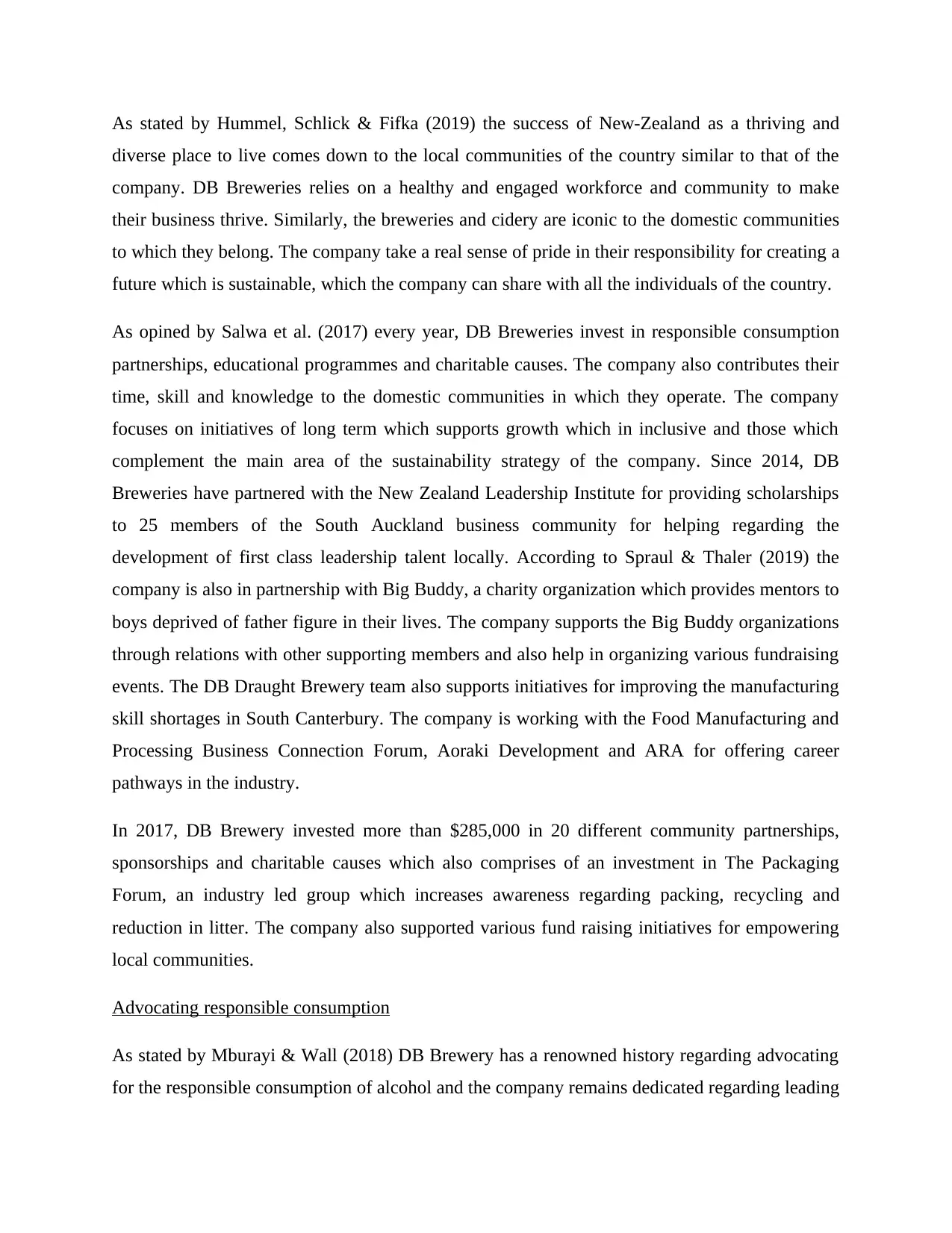
As stated by Hummel, Schlick & Fifka (2019) the success of New-Zealand as a thriving and
diverse place to live comes down to the local communities of the country similar to that of the
company. DB Breweries relies on a healthy and engaged workforce and community to make
their business thrive. Similarly, the breweries and cidery are iconic to the domestic communities
to which they belong. The company take a real sense of pride in their responsibility for creating a
future which is sustainable, which the company can share with all the individuals of the country.
As opined by Salwa et al. (2017) every year, DB Breweries invest in responsible consumption
partnerships, educational programmes and charitable causes. The company also contributes their
time, skill and knowledge to the domestic communities in which they operate. The company
focuses on initiatives of long term which supports growth which in inclusive and those which
complement the main area of the sustainability strategy of the company. Since 2014, DB
Breweries have partnered with the New Zealand Leadership Institute for providing scholarships
to 25 members of the South Auckland business community for helping regarding the
development of first class leadership talent locally. According to Spraul & Thaler (2019) the
company is also in partnership with Big Buddy, a charity organization which provides mentors to
boys deprived of father figure in their lives. The company supports the Big Buddy organizations
through relations with other supporting members and also help in organizing various fundraising
events. The DB Draught Brewery team also supports initiatives for improving the manufacturing
skill shortages in South Canterbury. The company is working with the Food Manufacturing and
Processing Business Connection Forum, Aoraki Development and ARA for offering career
pathways in the industry.
In 2017, DB Brewery invested more than $285,000 in 20 different community partnerships,
sponsorships and charitable causes which also comprises of an investment in The Packaging
Forum, an industry led group which increases awareness regarding packing, recycling and
reduction in litter. The company also supported various fund raising initiatives for empowering
local communities.
Advocating responsible consumption
As stated by Mburayi & Wall (2018) DB Brewery has a renowned history regarding advocating
for the responsible consumption of alcohol and the company remains dedicated regarding leading
diverse place to live comes down to the local communities of the country similar to that of the
company. DB Breweries relies on a healthy and engaged workforce and community to make
their business thrive. Similarly, the breweries and cidery are iconic to the domestic communities
to which they belong. The company take a real sense of pride in their responsibility for creating a
future which is sustainable, which the company can share with all the individuals of the country.
As opined by Salwa et al. (2017) every year, DB Breweries invest in responsible consumption
partnerships, educational programmes and charitable causes. The company also contributes their
time, skill and knowledge to the domestic communities in which they operate. The company
focuses on initiatives of long term which supports growth which in inclusive and those which
complement the main area of the sustainability strategy of the company. Since 2014, DB
Breweries have partnered with the New Zealand Leadership Institute for providing scholarships
to 25 members of the South Auckland business community for helping regarding the
development of first class leadership talent locally. According to Spraul & Thaler (2019) the
company is also in partnership with Big Buddy, a charity organization which provides mentors to
boys deprived of father figure in their lives. The company supports the Big Buddy organizations
through relations with other supporting members and also help in organizing various fundraising
events. The DB Draught Brewery team also supports initiatives for improving the manufacturing
skill shortages in South Canterbury. The company is working with the Food Manufacturing and
Processing Business Connection Forum, Aoraki Development and ARA for offering career
pathways in the industry.
In 2017, DB Brewery invested more than $285,000 in 20 different community partnerships,
sponsorships and charitable causes which also comprises of an investment in The Packaging
Forum, an industry led group which increases awareness regarding packing, recycling and
reduction in litter. The company also supported various fund raising initiatives for empowering
local communities.
Advocating responsible consumption
As stated by Mburayi & Wall (2018) DB Brewery has a renowned history regarding advocating
for the responsible consumption of alcohol and the company remains dedicated regarding leading
Paraphrase This Document
Need a fresh take? Get an instant paraphrase of this document with our AI Paraphraser
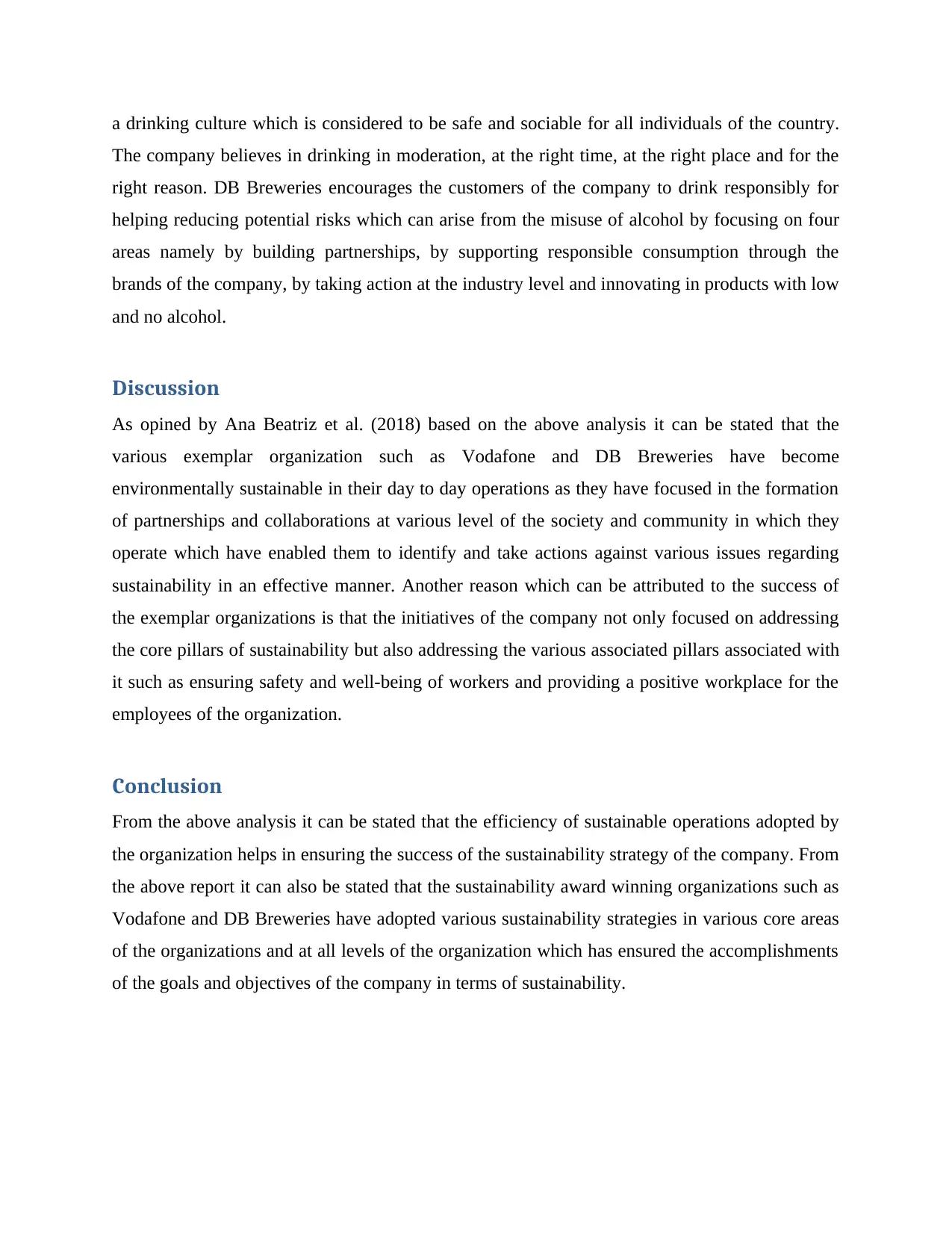
a drinking culture which is considered to be safe and sociable for all individuals of the country.
The company believes in drinking in moderation, at the right time, at the right place and for the
right reason. DB Breweries encourages the customers of the company to drink responsibly for
helping reducing potential risks which can arise from the misuse of alcohol by focusing on four
areas namely by building partnerships, by supporting responsible consumption through the
brands of the company, by taking action at the industry level and innovating in products with low
and no alcohol.
Discussion
As opined by Ana Beatriz et al. (2018) based on the above analysis it can be stated that the
various exemplar organization such as Vodafone and DB Breweries have become
environmentally sustainable in their day to day operations as they have focused in the formation
of partnerships and collaborations at various level of the society and community in which they
operate which have enabled them to identify and take actions against various issues regarding
sustainability in an effective manner. Another reason which can be attributed to the success of
the exemplar organizations is that the initiatives of the company not only focused on addressing
the core pillars of sustainability but also addressing the various associated pillars associated with
it such as ensuring safety and well-being of workers and providing a positive workplace for the
employees of the organization.
Conclusion
From the above analysis it can be stated that the efficiency of sustainable operations adopted by
the organization helps in ensuring the success of the sustainability strategy of the company. From
the above report it can also be stated that the sustainability award winning organizations such as
Vodafone and DB Breweries have adopted various sustainability strategies in various core areas
of the organizations and at all levels of the organization which has ensured the accomplishments
of the goals and objectives of the company in terms of sustainability.
The company believes in drinking in moderation, at the right time, at the right place and for the
right reason. DB Breweries encourages the customers of the company to drink responsibly for
helping reducing potential risks which can arise from the misuse of alcohol by focusing on four
areas namely by building partnerships, by supporting responsible consumption through the
brands of the company, by taking action at the industry level and innovating in products with low
and no alcohol.
Discussion
As opined by Ana Beatriz et al. (2018) based on the above analysis it can be stated that the
various exemplar organization such as Vodafone and DB Breweries have become
environmentally sustainable in their day to day operations as they have focused in the formation
of partnerships and collaborations at various level of the society and community in which they
operate which have enabled them to identify and take actions against various issues regarding
sustainability in an effective manner. Another reason which can be attributed to the success of
the exemplar organizations is that the initiatives of the company not only focused on addressing
the core pillars of sustainability but also addressing the various associated pillars associated with
it such as ensuring safety and well-being of workers and providing a positive workplace for the
employees of the organization.
Conclusion
From the above analysis it can be stated that the efficiency of sustainable operations adopted by
the organization helps in ensuring the success of the sustainability strategy of the company. From
the above report it can also be stated that the sustainability award winning organizations such as
Vodafone and DB Breweries have adopted various sustainability strategies in various core areas
of the organizations and at all levels of the organization which has ensured the accomplishments
of the goals and objectives of the company in terms of sustainability.
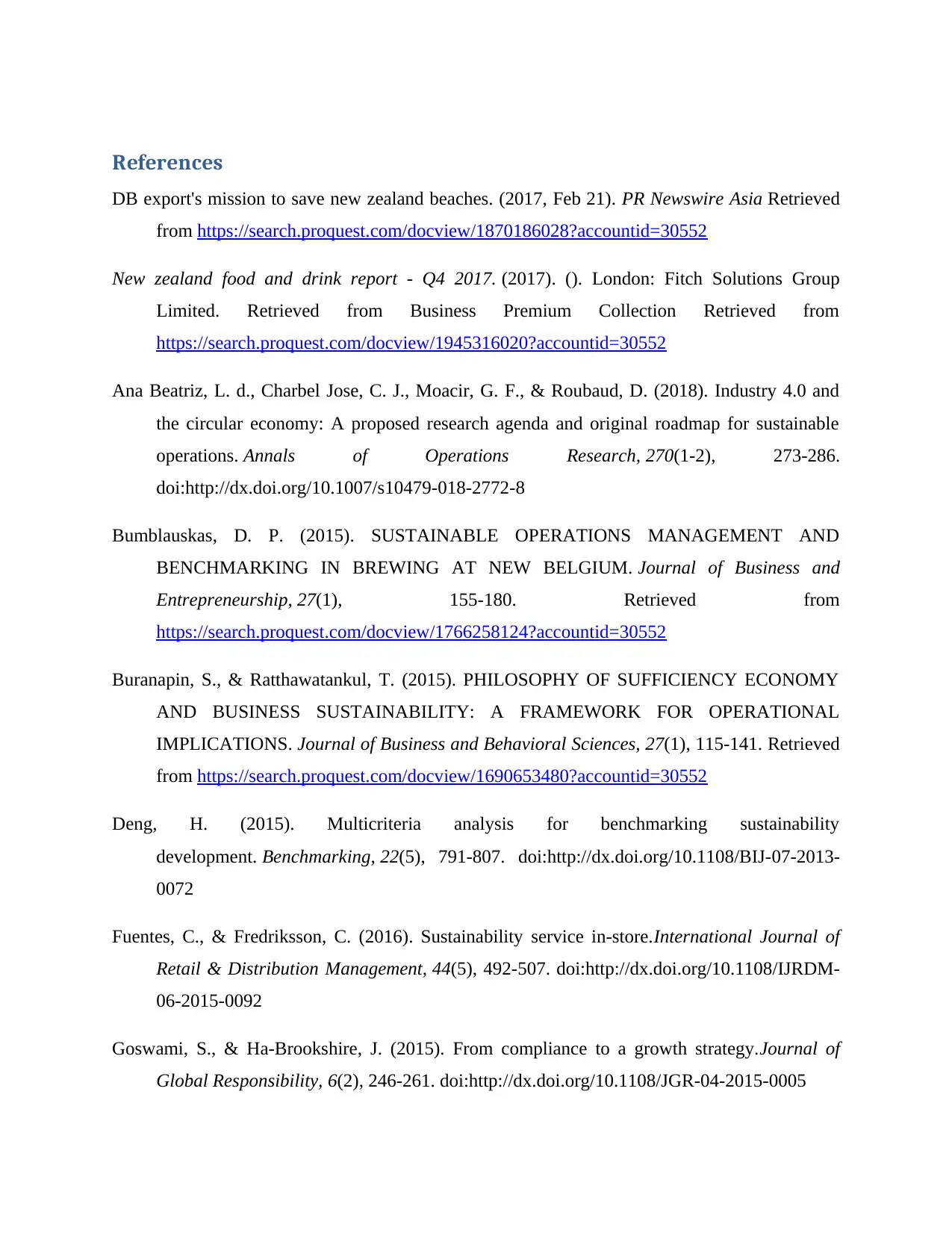
References
DB export's mission to save new zealand beaches. (2017, Feb 21). PR Newswire Asia Retrieved
from https://search.proquest.com/docview/1870186028?accountid=30552
New zealand food and drink report - Q4 2017. (2017). (). London: Fitch Solutions Group
Limited. Retrieved from Business Premium Collection Retrieved from
https://search.proquest.com/docview/1945316020?accountid=30552
Ana Beatriz, L. d., Charbel Jose, C. J., Moacir, G. F., & Roubaud, D. (2018). Industry 4.0 and
the circular economy: A proposed research agenda and original roadmap for sustainable
operations. Annals of Operations Research, 270(1-2), 273-286.
doi:http://dx.doi.org/10.1007/s10479-018-2772-8
Bumblauskas, D. P. (2015). SUSTAINABLE OPERATIONS MANAGEMENT AND
BENCHMARKING IN BREWING AT NEW BELGIUM. Journal of Business and
Entrepreneurship, 27(1), 155-180. Retrieved from
https://search.proquest.com/docview/1766258124?accountid=30552
Buranapin, S., & Ratthawatankul, T. (2015). PHILOSOPHY OF SUFFICIENCY ECONOMY
AND BUSINESS SUSTAINABILITY: A FRAMEWORK FOR OPERATIONAL
IMPLICATIONS. Journal of Business and Behavioral Sciences, 27(1), 115-141. Retrieved
from https://search.proquest.com/docview/1690653480?accountid=30552
Deng, H. (2015). Multicriteria analysis for benchmarking sustainability
development. Benchmarking, 22(5), 791-807. doi:http://dx.doi.org/10.1108/BIJ-07-2013-
0072
Fuentes, C., & Fredriksson, C. (2016). Sustainability service in-store.International Journal of
Retail & Distribution Management, 44(5), 492-507. doi:http://dx.doi.org/10.1108/IJRDM-
06-2015-0092
Goswami, S., & Ha-Brookshire, J. (2015). From compliance to a growth strategy.Journal of
Global Responsibility, 6(2), 246-261. doi:http://dx.doi.org/10.1108/JGR-04-2015-0005
DB export's mission to save new zealand beaches. (2017, Feb 21). PR Newswire Asia Retrieved
from https://search.proquest.com/docview/1870186028?accountid=30552
New zealand food and drink report - Q4 2017. (2017). (). London: Fitch Solutions Group
Limited. Retrieved from Business Premium Collection Retrieved from
https://search.proquest.com/docview/1945316020?accountid=30552
Ana Beatriz, L. d., Charbel Jose, C. J., Moacir, G. F., & Roubaud, D. (2018). Industry 4.0 and
the circular economy: A proposed research agenda and original roadmap for sustainable
operations. Annals of Operations Research, 270(1-2), 273-286.
doi:http://dx.doi.org/10.1007/s10479-018-2772-8
Bumblauskas, D. P. (2015). SUSTAINABLE OPERATIONS MANAGEMENT AND
BENCHMARKING IN BREWING AT NEW BELGIUM. Journal of Business and
Entrepreneurship, 27(1), 155-180. Retrieved from
https://search.proquest.com/docview/1766258124?accountid=30552
Buranapin, S., & Ratthawatankul, T. (2015). PHILOSOPHY OF SUFFICIENCY ECONOMY
AND BUSINESS SUSTAINABILITY: A FRAMEWORK FOR OPERATIONAL
IMPLICATIONS. Journal of Business and Behavioral Sciences, 27(1), 115-141. Retrieved
from https://search.proquest.com/docview/1690653480?accountid=30552
Deng, H. (2015). Multicriteria analysis for benchmarking sustainability
development. Benchmarking, 22(5), 791-807. doi:http://dx.doi.org/10.1108/BIJ-07-2013-
0072
Fuentes, C., & Fredriksson, C. (2016). Sustainability service in-store.International Journal of
Retail & Distribution Management, 44(5), 492-507. doi:http://dx.doi.org/10.1108/IJRDM-
06-2015-0092
Goswami, S., & Ha-Brookshire, J. (2015). From compliance to a growth strategy.Journal of
Global Responsibility, 6(2), 246-261. doi:http://dx.doi.org/10.1108/JGR-04-2015-0005
⊘ This is a preview!⊘
Do you want full access?
Subscribe today to unlock all pages.

Trusted by 1+ million students worldwide
1 out of 14
Related Documents
Your All-in-One AI-Powered Toolkit for Academic Success.
+13062052269
info@desklib.com
Available 24*7 on WhatsApp / Email
![[object Object]](/_next/static/media/star-bottom.7253800d.svg)
Unlock your academic potential
Copyright © 2020–2025 A2Z Services. All Rights Reserved. Developed and managed by ZUCOL.





